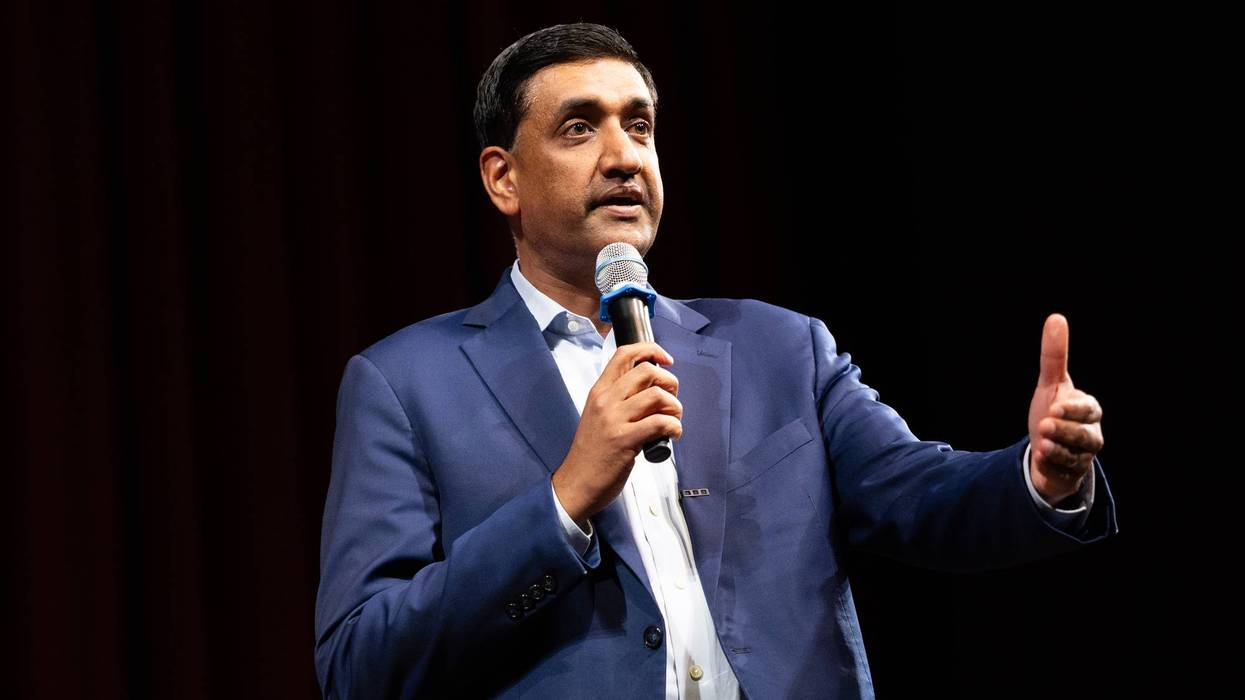October, 08 2018, 12:00am EDT

Government Watchdogs Call for an Impeachment Investigation Against Justice Kavanaugh for Potential Sexual Assault, Perjury, and Bringing the Judiciary into Disrepute
WASHINGTON
ImpeachBrett.org, a non-partisan campaign led by Free Speech For People, launched a petition today, following the vote in the U.S. Senate to confirm Brett Kavanaugh to the U.S. Supreme Court, calling on the House Judiciary Committee to begin immediate hearings on whether to impeach Judge Brett Kavanaugh on multiple counts of sexual assault, perjury, and bringing the judiciary into disrepute. Evidence has emerged that Justice Kavanaugh lied repeatedly under oath to the U.S. Senate Judiciary Committee in his 2004 and 2006 confirmation hearings to serve on the U.S. Court of Appeals for the D.C. Circuit and in his 2018 confirmation hearings to serve on the U.S. Supreme Court. Furthermore, during the Supreme Court confirmation process, the Senate received credible testimony that Justice Kavanaugh committed sexual assault in his past. The petition calls on The House Judiciary Committee to conduct a full factual investigation of these allegations.
"No one is above the law, not even a Supreme Court Justice," said John Bonifaz, Co-Founder and President of Free Speech For People. "There is overwhelming evidence that now-Justice Kavanaugh repeatedly lied under oath during this Supreme Court confirmation process and during the confirmation process in 2004 and 2006 for his position on the U.S. Court of Appeals for the D.C. Circuit. Further, Dr. Christine Blasey Ford has presented powerful and credible testimony that Brett Kavanaugh sexually assaulted her when she was 15 years old. And, there are serious allegations from two other women that he committed other acts of sexual violence. All of this warrants an immediate impeachment investigation."
"Even though the U.S. Senate has recklessly confirmed Judge Kavanaugh to the U.S. Supreme Court, the evidence remains that he committed perjury multiple times during these hearings and during his nomination hearings in 2004 and 2006 for a seat on the U.S. Court of Appeals for the D.C. Circuit," said Lisa Graves, the co-director of Documented. "And now there is disturbing evidence suggesting that he may have committed sexual assaults, and once again, lied about it to the Senate. It is imperative for the House Judiciary Committee to begin an impeachment investigation of Justice Kavanaugh. A judicial officer who has committed perjury, let alone sexual assault, does not belong on the Supreme Court or on any court in America."
"This shouldn't be controversial, but U.S. Supreme Court justices should not be sexual assailants or perjurers. The evidence suggests that Brett Kavanaugh committed sexual assault in his youth, and continues to lie about it today--just as the White House emails reveal that he lied in his first confirmation process about receiving stolen documents. The Senate rushed through this process without taking the opportunity to conduct a real investigation of the serious charges against Kavanaugh. It's not too late for the House of Representatives to demand answers, and if warranted after a full investigation, to impeach Kavanaugh." said Ron Fein, Legal Director of Free Speech For People.
"It is difficult to imagine a greater affront to our Constitutional order than allowing a man who has secured his judicial position by repeatedly lying under oath to serve on the highest Court in the land," said Ben Clements, a former federal prosecutor and Board Chair of Free Speech For People. "The specter of a man with a history of sexual assault and abusive treatment of women making the most important and impactful decisions about the rights of women and victims is equally outrageous. Congress must begin an impeachment investigation of Judge Kavanaugh immediately."
Federal judges, including U.S. Supreme Court Justices, can be impeached and removed from the judiciary for committing perjury and other offenses. Federal Judge Thomas Porteous was impeached by the U.S. House and convicted (90-6) by the U.S. Senate in 2010 on grounds which included that he "knowingly made material false statements about his past to ... the United States Senate ... in order to obtain the office of United States District Court Judge." The Senate subsequently voted to disqualify him from ever holding federal office again.
In 2012, the New York Commission on Judicial Conduct determined that a state family court judge, then 65 years old, should be removed from office because of a sexual assault that he had committed at age 25, 13 years before entering the judiciary. The commission found that "[t]here can be no dispute that it would be intolerable for a person holding a position of public trust to engage in such behavior," and while "it would be rare indeed for conduct so remote in time to disqualify a person from serving as a judge," the judge's misconduct was "of sufficient gravity as to render him unfit for judicial office." The New York State Court of Appeals agreed. It noted that "the petition is based solely on conduct that occurred 40 years ago - 13 years before petitioner was elevated to the bench," but concluded that "[n]evertheless, the misconduct alleged is grave by any standard" and rejected his challenge.
The Framers of the U.S. Constitution understood that corruption in the process of obtaining a federal office is an impeachable offense. In the constitutional debates over the impeachment power, George Mason asked rhetorically: "Shall the man who has practised corruption & by that means procured his appointment in the first instance, be suffered to escape punishment, by repeating his guilt?" Judge Kavanaugh's perjury in the process of obtaining his current appointment to the U.S. Supreme Court and his former position on the U.S. Court of Appeals for the D.C. Circuit, should, as with Judge Porteous, lead to his removal from the federal judiciary and should disqualify him from ever holding a future federal office.
For more information or to sign the petition, visit: www.ImpeachBrett.org
Free Speech For People is a national non-partisan non-profit organization founded on the day of the U.S. Supreme Court's ruling in Citizens United v. FEC that works to defend our democracy and our Constitution.
LATEST NEWS
'More Horrific Death and Destruction Will Come,' Warns Tlaib as Israeli Strike Kills Dozens of Iranian Kids
"These acts of war threaten to ignite a catastrophic regional war that will make no one safer while unleashing unconscionable suffering," said US Rep. Rashida Tlaib.
Feb 28, 2026
More than 50 young children were reportedly killed Saturday by an Israeli airstrike on southern Iran as the US and Israel carried out joint attacks across the country. A local official told Iranian state media that "an Israeli missile attack" hit a girls' elementary school in Minab.
Saturday is a school day in Iran. A school staff member told Middle East Eye that "you could hear the sound of children crying and screaming" following the strike.
“We still don’t know how many are under the rubble," said the unnamed staffer. "Some are even saying more than 100. Some of these small children are severely injured. Their parents have come to the school, and this place has turned into a house of mourning.”
Iranian media now report 40 killed and 48 students injured following the strike on a girls’ elementary school in Minab, as rescue and recovery efforts continue. https://t.co/kCR6Gagvip pic.twitter.com/faBFkgFn3D
— Ali Hashem علي هاشم (@Alihashem) February 28, 2026
Iranian Foreign Minister Abbas Araghchi wrote on social media that the school "was bombed in broad daylight, when packed with young pupils."
"Dozens of innocent children have been murdered at this site alone," he added. "These crimes against the Iranian people will not go unanswered."
Al Jazeera noted that "separately, Iran’s Mehr news agency reported that at least two students were killed by another Israeli attack that hit a school east of the capital, Tehran."
“Every war is a war on children," said Inger Ashing, CEO of the global humanitarian group Save the Children. "All children have the right to access a safe education, and schools should always be a haven for children—not a battlefield."
In a statement, US Rep. Rashida Tlaib (D-Mich.) alluded to the Minab school bombing as she condemned President Donald Trump for "acting on the violent fantasies of the American political elite and the Israeli apartheid government, ignoring the vast majority of Americans who say loud and clear: No More Wars."
"The Trump administration and Israeli regime’s illegal war of aggression on Iran has already killed dozens of children, and more horrific death and destruction will come," Tlaib warned. "These acts of war threaten to ignite a catastrophic regional war that will make no one safer while unleashing unconscionable suffering."
“President Trump will pretend this is about democracy and the rights of the Iranian people," she continued. "Don’t be fooled, Trump does not care about the Iranian people. The Iranian people are not pawns for the interests of foreign powers. Our government has imposed brutal sanctions that have destroyed the Iranian economy and the lives and livelihoods of millions of people. You cannot ‘free’ people by killing them and destroying their country."
Tlaib issued her statement shortly after Trump declared in a Washington Post interview that he decided to wage war on Iran to secure "freedom for the people." As of this writing, the White House has not responded to the Minab school massacre.
"I want a safe nation, and that’s what we’re going to have," Trump said as the US-Israeli onslaught hurled the Middle East into chaos.
Tlaib said in her statement that the US Congress "must stop the bloodshed by immediately reconvening to exert its war powers and stop this deranged president."
"But let’s be clear: Warmongering politicians from both parties support this illegal war, and it will take a mass anti-war movement to stop it," she added.
Keep ReadingShow Less
Demanding Action From Congress, Khanna Says 'The American People Are Tired of Regime Change Wars'
"We don't want to be at war with a country of 90 million people in the Middle East," said Democratic US Rep. Ro Khanna.
Feb 28, 2026
US Rep. Ro Khanna on Saturday demanded swift action from Congress to stop the Trump administration's unauthorized military assault on Iran, saying in a video posted to social media that "the American people are tired of regime change wars that cost us billions of dollars and risk our lives."
"We don't want to be at war with a country of 90 million people in the Middle East," said Khanna (D-Calif.), calling on Congress to reconvene for a vote on Monday.
"Every member of Congress should go on record today on how they will vote on Thomas Massie and my War Powers resolution," Khanna added, referring to the Kentucky Republican who is co-leading the measure.
If passed, the resolution would require the president "to terminate the use of United States Armed Forces from hostilities against the Islamic Republic of Iran or any part of its government or military, unless explicitly authorized by a declaration of war or specific authorization for use of military force against Iran."
The White House reportedly only notified some members of the House and Senate Armed Services Committees after the US-Israeli military assault on Iran began. According to Reuters, an Israeli defense official said that "the operation had been planned for months in coordination with Washington, and that the launch date was decided weeks ago."
Watch Khanna's remarks:
Trump has launched an illegal regime change war in Iran with American lives at risk. Congress must convene on Monday to vote on @RepThomasMassie & my WPR to stop this. Every member of Congress should go on record this weekend on how they will vote. pic.twitter.com/tlRi3Vz849
— Ro Khanna (@RoKhanna) February 28, 2026
Days prior to the US-Israeli attack on Iran, the House Democratic leadership announced it would force a vote next week on the Khanna-Massie War Powers resolution following reports that top Democrats were slowwalking the measure behind closed doors.
Senate Democrats also said they planned to vote next week on a War Powers resolution led by Sens. Tim Kaine of Virginia.
In a statement on Saturday, Kaine called the US attacks on Iran "illegal" and said that "every single senator needs to go on the record about this dangerous, unnecessary, and idiotic action."
“Has President Trump learned nothing from decades of US meddling in Iran and forever wars in the Middle East? Is he too mentally incapacitated to realize that we had a diplomatic agreement with Iran that was keeping its nuclear program in check, until he ripped it up during his first term?" Kaine asked. "These strikes are a colossal mistake, and I pray they do not cost our sons and daughters in uniform and at embassies throughout the region their lives. The Senate should immediately return to session and vote on my War Powers resolution."
The chances of a War Powers resolution getting through the Republican-controlled Congress are virtually nonexistent, even though the American public overwhelmingly opposes US military action against Iran. Senate Majority Leader John Thune (R-SD) and House Speaker Mike Johnson (R-La.) both issued statements applauding Trump for the unauthorized Saturday attacks.
Cavan Kharrazian, senior policy adviser to the advocacy group Demand Progress, said that "Trump has no authority to launch another war on his own."
"The Constitution is clear. The need for a War Powers resolution is clear. Congress decides when this country goes to war, not the president," said Kharrazian. "Next week, every member of Congress will have to choose. Side with illegal, endless war, or side with the American people and reject yet another regime change war in the Middle East. Like with Iraq, the choice they make will echo loudly for years to come.”
Keep ReadingShow Less
'The Behavior of Rogue States': Global Revulsion as US and Israel Launch War on Iran
"The attacks on Iran by Israel and the United States are illegal, unprovoked, and unjustifiable," said Jeremy Corbyn, an independent member of the UK Parliament.
Feb 28, 2026
Elected officials, activists, and experts around the world voiced horror and outrage Saturday as US President Donald Trump and Israeli Prime Minister Benjamin Netanyahu jointly launched an illegal war on Iran with the explicit goal of toppling the nation's government, sparking chaos throughout the Middle East.
The wave of bombings, expected to mark the beginning of a wider assault, spurred airspace closures and flight cancellations across the region as countries braced for the fallout. While European leaders offered milquetoast responses to the unlawful military attack and Canadian and Australian officials openly endorsed it, leftist politicians and others unequivocally condemned the US and Israel as the aggressors.
"The attacks on Iran by Israel and the United States are illegal, unprovoked, and unjustifiable," said Jeremy Corbyn, an independent member of the British Parliament and former leader of the UK Labour Party. "Peace and diplomacy was possible. Instead, Israel and the United States chose war."
"This is the behavior of rogue states—and they have jeopardized the safety of humankind around the world with this catastrophic act of aggression," Corbyn added. "Our government must condemn this flagrant breach of international law, and urgently pursue a foreign policy based on justice, sovereignty, and peace."
Progressive International co-founder Yanis Varoufakis, the former finance minister of Greece, echoed Corbyn's criticism of the US and Israel as "rogue states."
"Israel and the USA," he wrote on social media, "have started a war not against Iran but against the whole world. We stand with Iranians, with humanity, against the notion that Israel and the US can bomb anyone their fancy takes them to bomb."
Badr Albusaidi, the foreign minister of Oman and the mediator of recent US-Iran talks, said he was "dismayed" by news of the US-Israel attacks on Iran, which were quickly followed by reports of horrific atrocities. Albusaidi said hours before the bombs started falling on Iran that a diplomatic resolution was within reach.
"Active and serious negotiations have yet again been undermined," Albusaidi lamented on Saturday. "Neither the interests of the United States nor the cause of global peace are well served by this. And I pray for the innocents who will suffer. I urge the United States not to get sucked in further."
Leftist Colombian President Gustavo Petro said he believes "President Donald Trump has made a mistake today" and implored the "helpless United Nations" to "convene immediately" in response to the US-Israel attacks and retaliation by Iran and allied groups in the region.
Iran vowed a "crushing" response to the US-Israeli onslaught, firing drones and missiles at Israel and pledging to hit US military installations in the region.
Al Jazeera reported that "Iran has targeted United States assets across the Gulf Arab states in retaliation for a huge joint attack on Iran by the US and Israel, as the region’s worst fears of being ignited in the flames of a sustained war loom."
"The Iranian government on Saturday confirmed its attacks on several targets, according to the Fars news agency, including Bahrain, Kuwait, Qatar, and the United Arab Emirates, where US airbases are hosted," the outlet noted.
Keep ReadingShow Less
Most Popular


